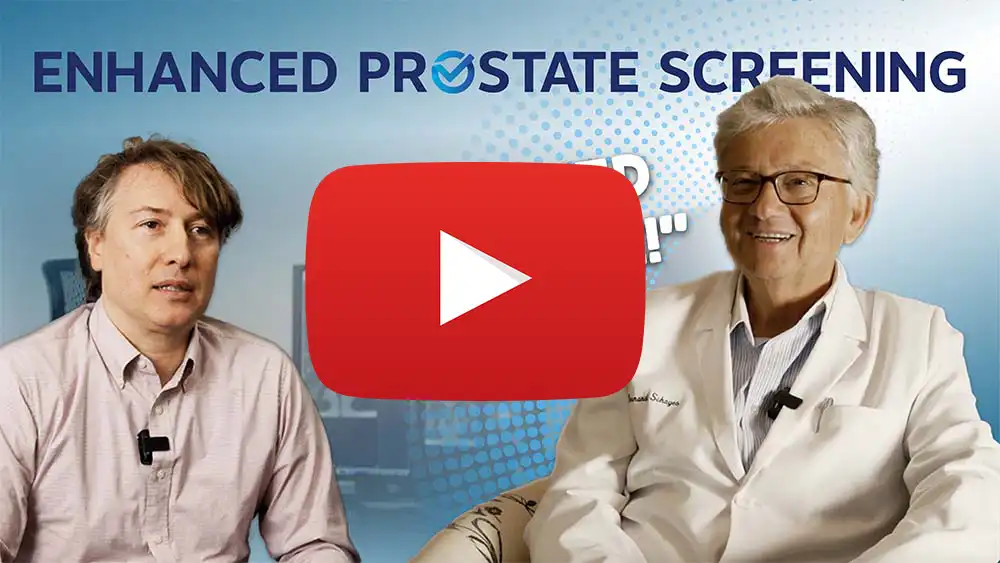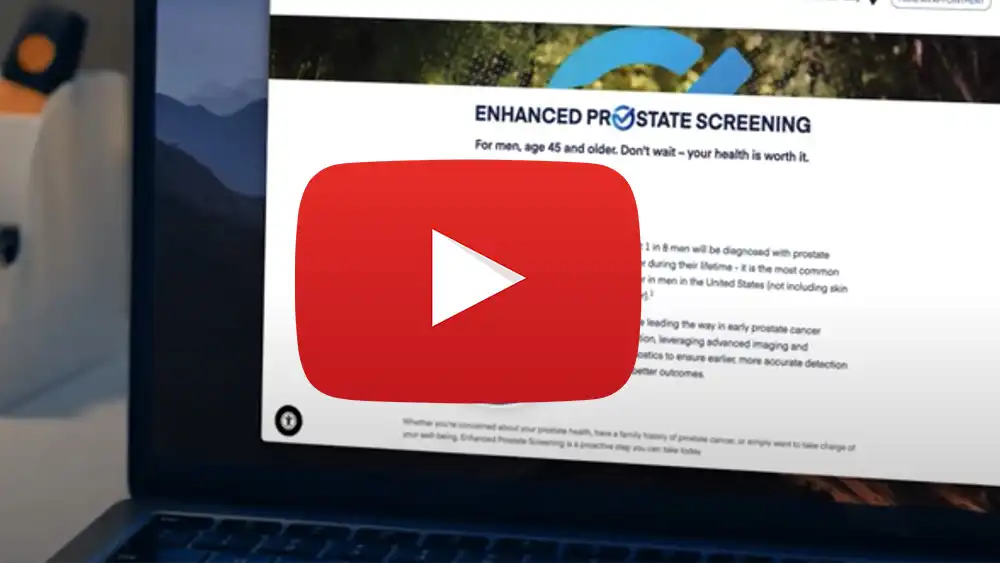
If you are a man aged 45 or older,
Enhanced Prostate MRI Screening may be right for you!
Call us today to schedule your prostate screening!
Enhanced Prostate Screening at
Lenox Hill Radiology
What is Enhanced Prostate Screening?
Enhanced Prostate Screening (EPS) provides a fast, accurate, and non-invasive way to detect prostate cancer early. EPS combines artificial intelligence (AI) technology with a rigorous clinical review process to significantly enhance the accuracy of a Prostate MRI screening. The AI helps radiologists detect subtle lesions in your Prostate MRI during the review process.
Enhanced Prostate Screening Criteria:
- Men age 45 and up
- No PSA (Prostate-Specific Antigen) score is required. If you have a PSA score, it must be less than 10 and acquired within the last year.
- If you have previously been diagnosed with prostate cancer or have had a biopsy of your prostate, this exam is not appropriate for you.
How Does Enhanced Prostate Screening Work?
- A referral is not required for this exam.
- You can self-pay at the time of service; insurance does not yet cover this exam. The fee is $275.
- You will be informed of minimal prep requirements before the exam.
- If you are claustrophobic, be assured that the exam takes only a few minutes and is performed feet first. Most of the time, your head stays outside of the MRI unit.
- Artificial Intelligence (AI) assists our experienced radiologists in reading your exam.
Why Choose Lenox Hill Radiology?
- Compassionate, professional care from skilled technologists who prioritize your comfort.
- Board-certified, sub-specialized radiologist.
- Advanced equipment and technology, including AI.
- Accurate and timely results.
- High-quality, cost-effective imaging.
Early detection saves lives. Routine screenings help to find cancer in its earliest stages, when it is most treatable.
FAQs – Frequently Asked Questions About
Enhanced Prostate Screening
Do I need an MRI screening if I’m healthy and don’t have a family history of prostate cancer?
Prostate cancer can form in healthy individuals without a family history of the disease. As you age, your body changes. A baseline prostate MRI and routine screenings help you and your provider understand your health and whether changes are normal or abnormal. This is an important discussion for you and your provider to have.
Are MRIs painful?
MRI scans are painless and safe. Our procedure does not use contrast (a fluid injected into your body to create certain images) or a probe injected into the rectum. Our exam is fast and does not require any invasive measures. Artificial intelligence, a key component of Enhanced Prostate MRI, does not add time or discomfort to the procedure.
I’m nervous about getting a scan. What if they find something?
A delayed cancer diagnosis is far more stressful than getting a screening. Information is power. Early detection offers men a five-year survival rate of almost 100%.
Can the MRI cause prostate cancer because of radiation?
No, MRI scans do not use radiation. AI also does not use radiation, as it is applied after the medical images are acquired. The only exception is if you are a metal worker or work with metal in any way. Such patients may require an X-ray, which has a very small amount of radiation, to ensure that no residual metal is in the body before having an MRI exam.
Am I too young for a prostate MRI?
We advise a baseline scan at the age of 45. Your trusted provider understands your medical history and risk, and that physician can help determine the optimal way to plan your prostate screening. If you have been diagnosed with prostate cancer in the past, screening is not appropriate for you.
Is my screening prostate MRI exam covered by my insurance?
Currently, insurance carriers do not cover the Enhanced Prostate MRI exam. There is an out-of-pocket cost of $275 for the screening.
What is the difference between a screening and a diagnostic MRI?
Screening prostate MRI exams are meant for men who have NOT been diagnosed with prostate cancer and do not have any of the typical symptoms of prostate cancer. A screening prostate exam helps identify potential disease at an early stage, so that it will be easier to treat.
Diagnostic prostate MRI exams are follow-up exams after a patient has visited the doctor with complaints or abnormal lab results. Generally, a blood test called Prostate-Specific Antigen (PSA) is ordered first. If the results are above a certain threshold or rising, and a manual exam of the prostate returns suspicious results, you can get referred for a diagnostic prostate MRI. Diagnostic exams are typically covered by insurance whereas screening exams are not.
Is it necessary to do prostate MRIs often?
Screening results and family history will indicate the interval at which you should return for routine screening. If your MRI exam shows no signs of prostate cancer, it is still possible for you to develop cancer in the future. It is unlikely for this to happen within a short period of time, but your physician can guide you on the interval, usually between one and five years, that is right for you.
Should I get a prostate MRI screening?
After age 40, your chance of getting prostate cancer significantly increases as you age. Additional factors that increase your risk for prostate cancer include having family members with the disease, having genetic risk, or being African-American. In these cases, screening with a prostate MRI can help detect the development of prostate cancer, especially since the standard blood test for prostate cancer (PSA test) can miss cancers. If you have been diagnosed with prostate cancer in the past, screening is not appropriate for you.
I have elevated PSA levels. Should I get an MRI first, or go directly for a biopsy?
Consult with your provider about the appropriate clinical steps to take. A PSA blood test is not always accurate at detecting prostate cancer. Your physician can advise whether an invasive biopsy is the next step. Enhanced Prostate MRI leverages artificial intelligence and advanced technology to deliver enhanced detection of prostate cancer.
How should I prepare for my scan?
Patients will receive complete prep instructions before the exam, which vary based on health history. For those with chronic constipation, an at-home enema is recommended before the exam. Patients who opt not to prepare with an enema are informed that the image quality may be affected as a result. There is a 10-15% incidence of limited diagnostic quality in the posterior area, where prostate cancer is most common. This will be noted in the exam report. Begin a clear liquid diet starting 8 hours prior to your appointment. Clear liquids include water, soup broth, Jello, hot/cold tea, Gatorade, and water-based popsicles. Take 2 Gas-X 125mg soft gels 25 minutes prior to your scheduled appointment. Do not wear any kind of metal, such as hairpins or jewelry.
If you have claustrophobia, rest assured that your head remains outside of the MRI unit.
Patients with a continuous Glucose Monitoring System or Neulasta device will remove the device before the exam, and therefore should bring a replacement sensor to wear following the scan. The exam cannot be performed with that device in place, regardless of body part being imaged.
Patients with a cardiac monitor; Medtronic drug infusion system; nerve stimulator; or programmable shut, stent, eye, or ear implant must contact us with the device name and model before the appointment. This ensures patient safety. Likewise, those with a pacemaker or heart defibrillator must contact the office before the exam.
What should I expect during the MRI scan?
Our trained technologists will help you lie down on the MRI bed that will slide into the scanner. If you are claustrophobic, be assured that your head will not be inside the unit; you enter feet first. You do not need to undress for the MRI, but do wear comfortable clothes with no metal (such as zippers). You will remain still on the scanner for a short period of time to capture the images. Your physician will contact you to discuss the results.
I have claustrophobia. Can I get an MRI scan?
Yes. Your body enters the scanner feet first which allows your head to be outside of the unit. We work with a shortened MRI protocol, so the exam is as quick as possible.
How is the Artificial Intelligence (AI) used by radiologists and how quickly can it process images?
Our FDA-cleared AI technology, called Saige-Prostate, assists radiologists while they are interpreting your MRI exam. It processes the images and very quickly displays clinical information for the radiologist to use.
Does this replace the radiologist? Is a computer going to be processing my MRI scan?
No. This technology does not replace the radiologist. Saige-Prostate AI helps the radiologist by providing additional information, which is factored into the interpretation of your exam.
Does the use of AI in the MRI process expose me to radiation?
No, MRI exams do not use radiation, nor does AI. The AI technology is utilized on images that the MRI scanner acquired; it does not create new images.
Has the AI been reviewed by the FDA?
Yes, Saige-Prostate received FDA clearance.
What if the AI finds something suspicious, then what?
When the radiologist is reading your exam, Saige-Prostate technology shows areas of suspicion for further attention. The radiologist uses their training and expertise to arrive at the final interpretation of the exam, including whether follow-up imaging or tests are needed. If your exam has a suspicious finding, a physician will discuss this with you and will review the different options for follow-up care.
Are the MRI images and my personal information shared and stored in a secure way?
Yes. All your personal information, including the MRI images, is stored in a secure patient portal, only accessible by you and your healthcare providers.
Do I get a report from the exam?
Patients will receive a lay letter with their results. If a provider’s name wasn’t provided at time of scheduling, they will receive a copy of their report as well. This report indicates the findings of your exam and whether you have abnormalities in your prostate. It is important that you discuss the report with your physician.
www.radnet.com/lenox-hill-radiology/for-patients/patient-portal
Watch our videos to learn more about the importance of Enhanced Prostate Screenings!
Sources:
- 1 American Cancer Society
- 2 https://jamanetwork.com/journals/jamaoncology/article- abstract/2817308
https://www.ncbi.nlm.nih.gov/pmc/articles/PMC9184263/










